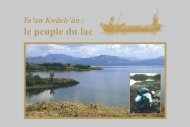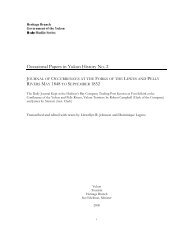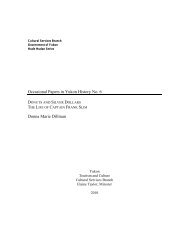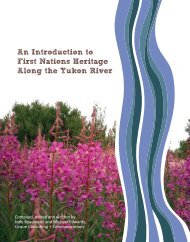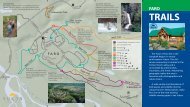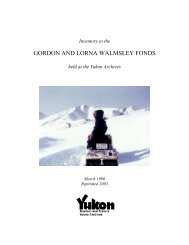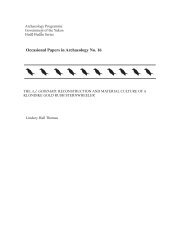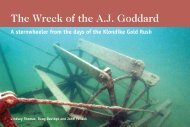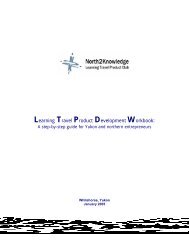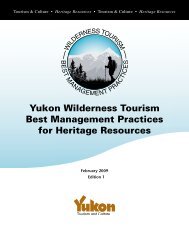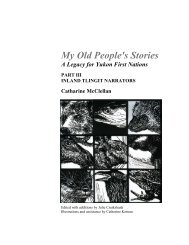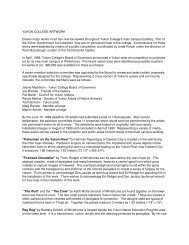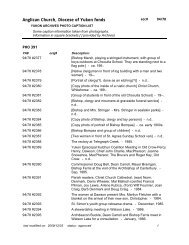Sustainable Tourism: The Tour Operators' Contribution
Sustainable Tourism: The Tour Operators' Contribution
Sustainable Tourism: The Tour Operators' Contribution
Create successful ePaper yourself
Turn your PDF publications into a flip-book with our unique Google optimized e-Paper software.
4. Product Management and Development<br />
4.1 British Airways Holidays:<br />
Life Cycle Assessment of a Key Destination<br />
Description of Good Practice<br />
To improve the planning in one of its key destinations, St. Lucia, British<br />
Airways Holidays (BAH), the airline’s wholly owned subsidiary, and a longhaul<br />
and city-break specialist, undertook a Life Cycle Assessment (LCA)<br />
of the island’s tourism products, to assess it as a holiday destination and<br />
develop recommendations for how to promote sustainable tourism.<br />
An LCA is a form of analysis used to identify inputs and quantify environmental impacts from ‘cradle to<br />
grave’. In general, the LCA framework is based on four basic components:<br />
1. Goal definition and scope: <strong>The</strong> tourism product(s) are identified and the required level of detail is<br />
defined. This stage sets the time and resource constraints that will determine the depth of the study.<br />
2. Inventory analysis: <strong>The</strong> inputs and outputs associated with the products – energy and raw materials<br />
used, emissions to the atmosphere, discharges to water and depositions to land – are quantified. This<br />
is known as conducting a life cycle inventory (LCI), which can be used on its own to assess environmental<br />
issues of concern.<br />
3. Impact assessment: <strong>The</strong> environmental impacts identified in the LCI are reviewed and the data are<br />
classified, characterized and evaluated so that different environmental impacts can be compared and<br />
weighted in importance. <strong>The</strong> impacts addressed include water pollution, air pollution, noise, aesthetic<br />
damage, habitat loss, natural resource exploitation and disruption of natural cycles.<br />
4. Improvement assessment: <strong>The</strong> results are reported and the need and opportunities to reduce the<br />
impacts of the product on the environment are then evaluated. <strong>The</strong> feasibility of implementing changes<br />
to lessen these impacts are then considered.<br />
Implementation<br />
BAH developed its LCA methodology for tourism products based on the application of the process in other<br />
industry sectors and guidelines produced by the United Nations Environment Programme (Life Cycle<br />
Box 1: Results of the St. Lucia LCA<br />
<strong>The</strong> UK CEED study found that the greatest environmental impacts from tourism came from infrastructure<br />
development and inadequate waste management. <strong>The</strong> study recommended that BAH review the environmental<br />
performance of its suppliers, particularly hotels.<br />
<strong>The</strong> study determined that the general impacts of tourism on St Lucia include:<br />
• Land consumption, habitat loss and disturbance to ecosystems caused by site and infrastructure development;<br />
• Destruction of coral reefs through increased sedimentation from land clearing for the construction of hotels<br />
and roads, and artificial beach maintenance;<br />
• Water pollution from hotel wastewater treatment plants failing or operating below optimum capacity;<br />
• Inadequate solid waste management and disposal systems, which have led to the leaching of pollutants<br />
from landfill sites; and<br />
• Water pollution and anchor damage to reefs caused by water sports.<br />
UK CEED also reported on the environmental impacts of all-inclusive resorts, noting that ‘All-inclusive resorts<br />
are generally associated with significant environmental impacts. One example is the habitat loss resulting<br />
from the construction of the Jalousie Resort between the Piton peaks in an area nominated for World Heritage<br />
Site status. However, whilst all-inclusives tend to have greater environmental impacts than most conventional<br />
hotels in St. Lucia, in most instances this is not because of the type of holiday package per se. Rather, it is<br />
because all-inclusive resorts tend to be owned by international chains operating larger scale resorts, which<br />
occupy land on the beachfront. <strong>The</strong> evidence suggests that the environmental impacts of conventional hotels<br />
of a comparable size on the shoreline are of a similar scale. Indeed, several all-inclusives in St. Lucia were<br />
originally built as conventional hotels and Jalousie has been converted to a non-inclusive.’<br />
<strong>Sustainable</strong> <strong><strong>Tour</strong>ism</strong>: <strong>The</strong> <strong>Tour</strong> Operators’ <strong>Contribution</strong>




